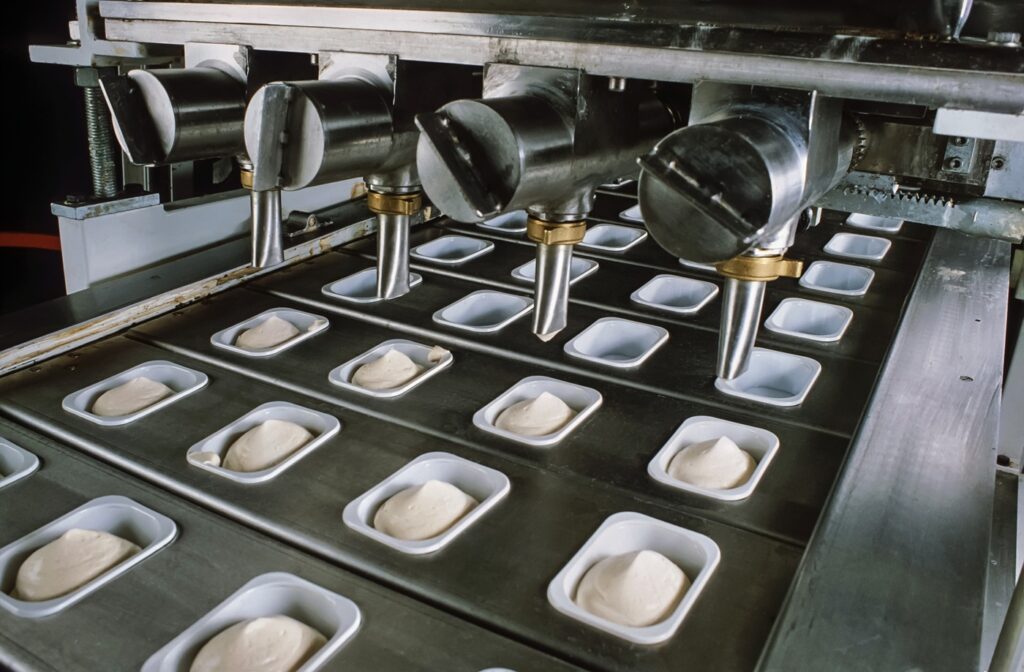Filling and depositing systems sit at the heart of food and drink production, where efficiency, precision, and hygiene can make or break profitability. With new sustainability legislation, consumer trends, and advanced technologies reshaping the sector, manufacturers face a decisive moment: upgrade or fall behind.
Legislative Pressures: Compliance Meets Capability
Sustainability is no longer a future consideration—it’s here, and it’s costly if ignored. Two key UK policies are directly influencing the design and adoption of filling and depositing machinery:
- Plastic Packaging Tax – Since 2022, UK businesses pay tax on plastic packaging with less than 30% recycled content. This makes alternative materials—such as paper-based liners, thinner films, or bioplastics—more attractive. However, these substrates are often less consistent and more fragile. Today’s filling lines must therefore handle these materials without tearing seals, jamming machines, or compromising product integrity.
- Extended Producer Responsibility (EPR) – Rolling out from 2025, this scheme will make manufacturers pay the full net cost of collecting and recycling their packaging. Precision filling is critical here: even minor spills or contamination on seals can render packaging unrecyclable. In turn, lightweighting, mono-material packaging, and easy recyclability demand highly accurate, waste-minimising equipment.
These measures are not just compliance hurdles—they are economic levers pushing companies to invest in smarter, more versatile machinery.
Smarter Technology: From AI to Automated Hygiene
The “future” of filling and depositing is already on the factory floor. Manufacturers are embracing technologies that improve accuracy, reduce waste, and safeguard uptime.
- AI-Powered Vision Systems – High-speed cameras paired with AI now go beyond weight checks. They monitor swirl patterns on yogurts, confirm correct compartment filling in ready meals, and detect foreign objects. Crucially, AI can adjust fill pressure and timing in real time, reducing costly product giveaway and ensuring portion consistency.
- Predictive Maintenance with IoT – Sensors embedded in pumps, motors, and nozzles stream data on vibration, pressure, and temperature to the cloud. Machine learning analyses these inputs to spot wear or misalignment before breakdowns occur. For plant managers, this transforms maintenance from disruptive and reactive to scheduled and preventative.
- Advanced Hygienic Design & CIP (Clean-in-Place) – Regulatory and allergen pressures mean hygiene is paramount. New depositors feature sloped surfaces, minimal crevices, and stainless-steel builds to eliminate bacterial harbours. Automated CIP systems reduce water, chemical, and labour costs while cutting downtime—cleaning and sanitising equipment with minimal disassembly and human intervention.
Market Forces: Products Driving Innovation
The design of today’s filling and depositing machinery is shaped as much by consumers as by regulators. Three trends stand out:
- Plant-Based & Free-From Foods – Thick nut butters, fibrous sauces, and dairy alternatives pose major challenges for viscosity and homogeneity. Deposit systems must provide gentle, consistent handling to preserve texture and flavour while ensuring smooth throughput.
- Convenience & Meal Complexity – From ready meals to meal kits, demand is growing for products with multiple components portioned precisely in one tray. This has driven the rise of multi-head depositors and robotic systems capable of portioning mash, protein, vegetables, and sauces into separate compartments—all at line speed.
- SKU Proliferation & Personalisation – With brands constantly releasing new sizes, flavours, and seasonal editions, short runs are the norm. Equipment must support rapid changeovers. Tool-free, colour-coded change parts and PLC recipe storage now allow operators to switch between product formats in minutes, maintaining agility without compromising efficiency.
The ROI Case for Investment
For decision-makers, the calculus is straightforward: new filling and depositing technologies not only ensure compliance with legislation but also deliver direct ROI. Less giveaway reduces raw material costs, predictive maintenance cuts downtime losses, and CIP saves on labour and utilities. Combined, these benefits can transform margins in a sector where efficiency is everything.
Conclusion
Filling and depositing technology is no longer just about speed and volume—it’s about sustainability compliance, digital intelligence, and consumer-driven flexibility. Manufacturers that invest in smart, hygienic, and adaptable systems are better positioned to meet legislative requirements, satisfy evolving consumer expectations, and protect profitability in a competitive market.

